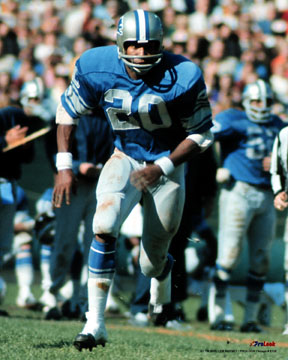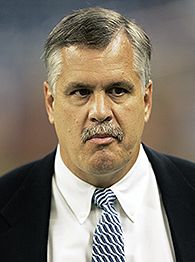Perhaps the most memorable was a win in 1974.
The Lions, when they invaded the old Metropolitan Stadium in October '74, hadn't beaten the Vikings since December, 1967. That was 13 straight losses to the Purple People Eaters, who will always be my most hated team in all of sports. And, the Lions were 1-4, which didn't inspire much confidence. Part of the early-season strife could be blamed on the death of head coach Don McCafferty, who died of a heart attack during training camp, while cutting his lawn at home. McCafferty's death thrust assistant Rick Forzano into the top spot. Forzano was a former college coach who'd never been a head coach at the pro level. The latter distinction had never stopped the Lions, of course, from hiring such folks, but McCafferty's untimely passing was an excusable reason for giving the untested Forzano the job.
The Lions managed to nudge ahead of the powerful 5-0 Vikings, 20-16, as the fourth quarter clock wound down. But Minnesota was on the move. It looked like they would, once again, steal a win from the Lions, who during the 0-13 streak had the Vikes on the ropes many times, only to have something weird happen to them.
The Vikings drove down the field, led by Fran Tarkenton. But being down by four, they needed a touchdown. They neared the Lions' 20-yard line.
Tarkenton scrambled and fired a pass in the end zone. There was a collision, and the ball popped gently into the air. But instead of being snagged by a Vikings receiver (which wouldn't have been surprising), the football was cradled by DB Lem Barney. His secondary mates crowded around Barney and forced him to down the ball in the end zone, ensuring the Lions victory. The 0-13 streak was over -- and with the 1-4 Lions beating the 5-0 Vikings!

Barney, who hadn't beaten the Vikings since his rookie season in 1967, before sealing 1974's win in Minnesota with a pick in the end zone
It was so ironic, because many much better Lions teams had outplayed the Vikings in the past yet lost.
Another win in Minnesota that sticks out was in 1991, the Sunday before Thanksgiving. This was the 12-4, Mike Utley year. It wasn't so much the win that stands out as the move that Barry Sanders made on safety Joey Browner that I swore could have blown out both of Browner's knees.
Sanders got into the open field and juked Browner -- who was a pretty darn good player -- so badly that he, at once, both froze Browner and rattled the safety's knees. He reduced a Pro Bowl player to nothing more than an orange construction zone cone. Of course, Sanders also made other great players look silly in similar scenarios, such as Rod Woodson (who really did blow out a knee against Sanders) and John Lynch.
Then there was a 1993 win, in which the Lions trailed 27-23 in the waning seconds on Sunday Night Football. But Rodney Peete drove the Lions downfield and, facing a fourth-and-goal, threw in the direction of Brett Perriman in the end zone. There was contact, but it would have been unsurprising if the officials called nothing, especially on such a crucial play. Yet here comes the flag, to the howls of the Metrodome crowd. Now with first-and-goal at the one, the Lions scored, and stole a 30-27 win just before the final gun.
"Couldn't have happened to a better team," I said of the Vikings.
Sunday, the Lions return to another of their houses of horrors. They need a win in the worst way, and they could have picked a better place to seek it than the awful Metrodome. Strange things happen to them in the state of Minnesota. Always have.













